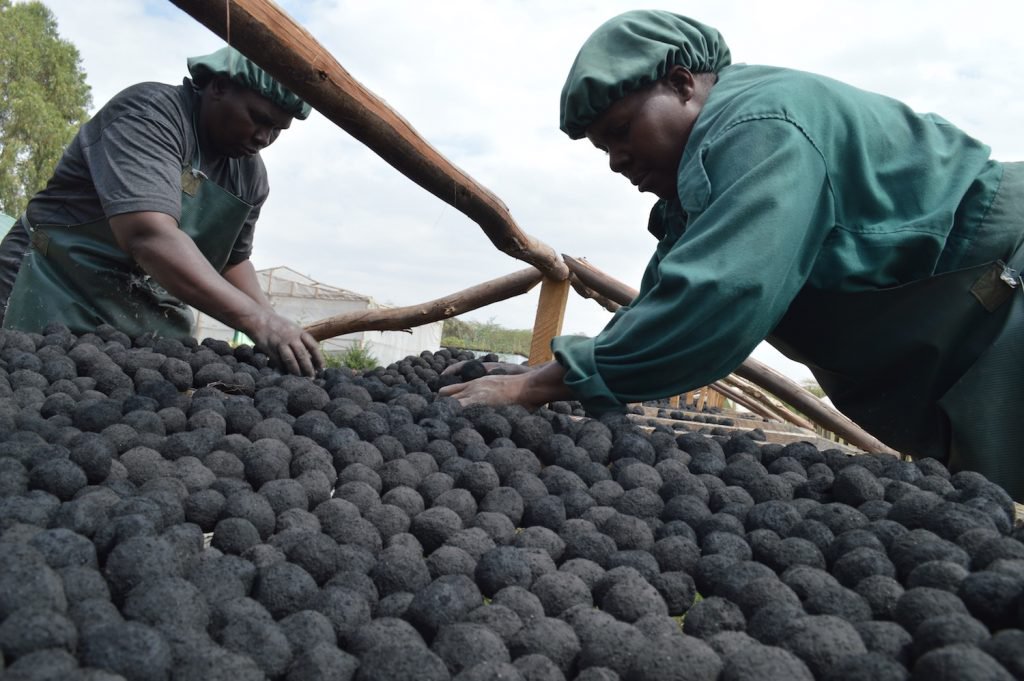ImpactAlpha, May 14 – Entrepreneurs are uprooting long-held assumptions and beliefs in emerging markets to deliver critical services that enable economic growth and resilience.
The diverse array of ideas goes well beyond the mold of breakthrough technology.
Entrepreneurs in emerging markets are developing innovative business models that find new economic value in waste, unlock dormant productivity in novel ways and change long-established rules across sectors and industries.
Business model innovation, more than strictly inventive technology, may hold the key to building a company that delivers real value – and real impact – in emerging economies.
As an investor in high-impact, early-stage ventures in emerging markets, FINCA Ventures has seen firsthand how entrepreneurs are disrupting business models to deliver impact in underserved markets and are creating sustainable, steadily growing businesses.
Disrupting beliefs
Naivasha, Kenya-based Sanivation, a FINCA Ventures investee, has worked to shift long-held paradigms. While many assumed that municipal sanitation must be a cost center, Sanivation’s business model made it a profit generator for developing country municipalities.
Municipal sanitation services in Kenya (like much of sub-Saharan Africa) are chronically overburdened and resource-constrained.
Sanivation recognized that fecal sludge has a high calorific value (read: high energy) and saw an opportunity to transform waste into a fuel product fit for their market. In partnership with the local municipality, Sanivation created waste-to-energy treatment plants that convert fecal sludge into charcoal and firewood substitutes that burn cleaner and longer than traditional fuels. Revenue from fuel sales offsets the cost of processing, making waste treatment a near zero-cost investment for cash-strapped municipalities.
Technology plays a critical role in Sanivation’s business model. Sanivation received a Patent for Humanity Award for its innovative approach to safely-managed waste processing.
More importantly, Sanivation reframed what sanitation services could be. Their business model transforms human waste into economic value, while safely-managing sanitation, improving water quality and protecting the environment.
Good Nature Agro, another FINCA Ventures investee, has disrupted critical elements of the agricultural value chain in eastern Zambia.
Smallholder farmers typically decide their crop cultivation based on cash-conversion potential and food security. The urgency around achieving calorie goals on small acreages, coupled with the familiarity and ease of growing cash crops, have contributed to the misinformed belief that smallholder farmers would struggle to grow legume seeds, which require a higher degree of quality control and technical farming skill.
With better seeds and more thorough training, Good Nature Agro has challenged this long-held assumption.
Today, Good Nature Agro’s legume seeds deliver 2.7x the yield of competitors, enabling their growers to improve yields by 2x and incomes by 3x. Its private agent outreach network—a core pillar of the business model—offers one agent for every 40 farmers. Compared with the government model that may see up to 5,000 farmers for every one agent, the company is able to deliver superior training across its grower network.
Good Nature Agro has shifted deeply held assumptions, with significant benefit to customers and their families.
Value creation
Technological and scientific breakthroughs play a critical role in enabling economic resilience. But for emerging markets, the Silicon Valley approach of strictly focusing on massively scalable technology doesn’t go far enough.
As early-stage impact investors, we see great promise in business model innovation: the pursuit of “disruptive beliefs” over strictly disruptive product innovation. Business model innovation, even more so than invention alone, offers compelling value propositions in emerging markets.
No matter the type of investment, it is important to foster a culture of directed curiosity—upending the assumptions around how businesses can and should operate.
FINCA Ventures tries to challenge the entrepreneurs we work with (and ourselves) to reconsider the long-held, core beliefs within their industries about how to create value.
We then, collectively, look to turn those beliefs on their heads, and formulate new hypotheses that test our most deeply-held assumptions in new and challenging ways.
New hypotheses become the reframed beliefs that can guide our investee’s approach. As investors, we must be willing to consider innovating our own beliefs and assumptions.
This approach, adapted from one articulated four years ago, is particularly instructive in engaging entrepreneurs who are creating new solutions to basic services.
In the process of breaking down a long-held belief, we consider its applicability and limitations in the context of the developing markets where we work.
How relevant are industry assumptions about regulation, business economics and ways of operating? Which insights are universal? Which assumptions are unfounded?
And where is there an opportunity—no, a call—to create new assumptions about the ways of operating?
New capital models
Impact investors must embrace the business model disruption process and take a more active role in re-thinking the forms of capital and methods of investment, both for their entrepreneurs and their own organizations.
FINCA Ventures also recognizes that these companies then require another layer of disruption, around capital requirements.
Business model innovators may need non-dilutive and equity capital at the same time for different components of the business model. They may also require more patient debt and will not follow the scaling pathways of pure technology (product invention) companies. Accommodating these differences is essential to fostering the work of true business model innovators.
To fully support business model innovators, impact investors must disrupt their investment models and reevaluate how project financing, trade finance and even microfinance can and should be employed to catalyze business model innovation.
Doing so will help to fundamentally reframe how, and to whom, capital is delivered and will potentially shape the future of social enterprise.
Ami Dalal is managing director at FINCA Ventures.











